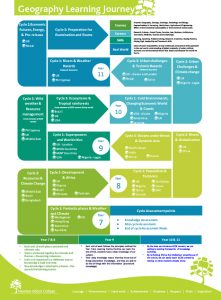Intent
We aim to create knowledgeable students who have a deep understanding of the earth’s key physical and human processes. Our curriculum will explore thematic topics before applying them to regions and contemporary issues. Our curriculum structure and content is influenced by the book ‘Powerful Geography’ by Mark Enser, as well as various articles in Teaching Geography, published by the Geographical Association. Our curriculum enables students with opportunities to:
- develop geographical fluency so that students can ‘think’ and ‘write’ like a geographer
- appreciate the range and variety of human societies across the world
- extend knowledge from the familiar to the unfamiliar by taking students beyond themselves and everyday experiences
- develop their identity and sense of place in the world
- carry out geographical enquiries to enable them to deepen their conceptual understanding through reasoning, interpreting and analysing data
- question and debate knowledge



